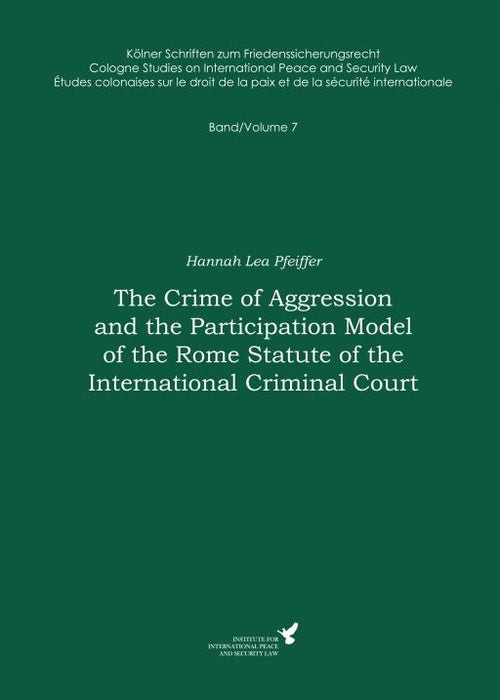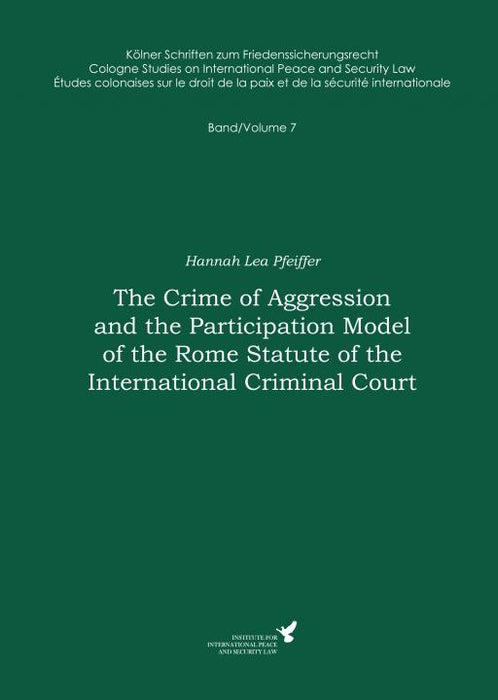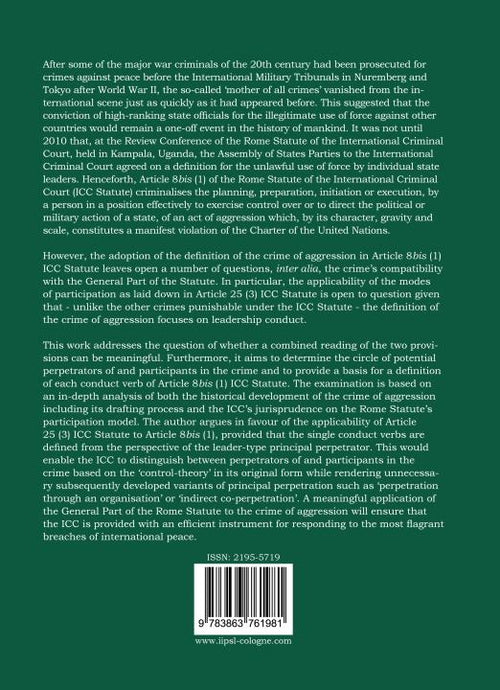Volume 7 | The Crime of Aggression and the Participation Model of the Rome Statute of the International Criminal Court
- Brand: Prof. Dr. Claus Kreß | Kölner Schriften zum Friedenssicherungsrecht
- Availability: In stock
- SKU: 9783863761974
€69,90
After some of the major war criminals of the 20th century had been prosecuted for crimes against peace before the International Military Tribunals in Nuremberg and Tokyo after World War II, the so-called 'mother of all crimes' vanished from the international scene just as quickly as it had appeared before....
After some of the major war criminals of the 20th century had been prosecuted for crimes against peace before the International Military Tribunals in Nuremberg and Tokyo after World War II, the so-called 'mother of all crimes' vanished from the international scene just as quickly as it had appeared before. This suggested that the conviction of high-ranking state officials for the illegitimate use of force against other countries would remain a one-off event in the history of mankind. It was not until 2010 that, at the Review Conference of the Rome Statute of the International Criminal Court, held in Kampala, Uganda, the Assembly of States Parties to the International Criminal Court agreed on a definition for the unlawful use of force by individual states leaders. Henceforth, Article 8bis (1) of the Rome Statute of the International Criminal Court (ICC Statute) criminalises the planning, preparation, initiation or execution, by a person in a position effectively to exercise control over or to direct the political or military action of a state, of an act of aggression which, by its character, gravity and scale, constitutes a manifest violation of the Charter of the United Nations.
However, the adoption of the definition of the crime of aggression in Article 8bis (1) ICC Statute leaves open a number of questions, inter alia, the crime's compatibility with the General Part of the Statute. In particular, the applicability of the modes of participation as laid down in Article 25 (3) ICC Statute is open to question given that - unlike the other crimes punishable under the ICC Statute - the definition of the crime of aggression focuses on leadership conduct.
This work addresses the question of whether a combined reading of the two provisions can be meaningful. Furthermore, it aims to determine the circle of potential perpetrators of and participants in the crime and to provide a basis for a definition of each conduct verb of Article 8bis (1) ICC Statute. The examination is based on an in-depth analysis of both the historical development of the crime of aggression including its drafting process and the ICC's jurisprudence on the Rome Statute's participation model. The author argues in favor of the applicability of Article 25 (3) ICC Statute to Article 8bis (1), provided that the single conduct verbs are defined from the perspective of the leader-type principal perpetrator. This would enable the ICC to distinguish between perpetrators of and participants in the crime based on the 'control theory' in its original form while rendering unnecessary subsequently developed variants of principal perpetration such as 'perpetration through an organization' or 'indirect co-perpetration '. A meaningful application of the General Part of the Rome Statute to the crime of aggression will ensure that the ICC is provided with an efficient instrument for responding to the most flagrant breaches of international peace.
Details
- Title: The Crime of Aggression and the Participation Model of the Rome Statute of the International Criminal Court
- Author: Dr. Hannah Lea Pfeiffer
- Series: Cologne Occasional Papers on International Peace and Security Law
- Edition: 1st edition
- Band: 7
- Publisher: Prof. Dr. Claus Kress
- Published: 1st edition 12/31/2017
- Subject: Law
- Product Type: Book (Hardcover)
- Product type: Dissertation
- Language: English
- Binding: Hardcover
- Dimensions: 21.0 x 14.8 cm (DIN A5)
- Extent: 324 pages
- Condition: New (shrink-wrapped in foil)
- Keywords: Crime of Aggression, Criminal Liability, ILC Draft Codes, Legal Heritage of Nuremberg, Legal Heritage of Tokyo, Nuremberg Tribunal
Downloads
DRM: Digital Watermark
This eBook contains a digital watermark and is therefore personalized for you. If the eBook is passed on to third parties abusively, it is possible to trace it back to the source.
File format: PDF (Portable Document Format)
With a fixed page layout, the PDF is particularly suitable for specialist books with columns, tables and figures. A PDF can be displayed on almost all devices, but is only suitable to a limited extent for small displays (smartphone, e-reader).
System requirements:
PC/Mac: You can read this eBook with a PC or Mac. You need a PDF viewer - e.g. Adobe Reader.
eReader: This eBook can be read with (almost) all eBook readers. However, it is not compatible with the Amazon Kindle.
Smartphone/Tablet: Whether Apple or Android, you can read this eBook. You need a PDF viewer - e.g. Adobe Reader.
Buying eBooks from abroad
For tax law reasons we can sell eBooks just within Germany and Switzerland. Regrettably we cannot fulfill eBook orders from other countries.



